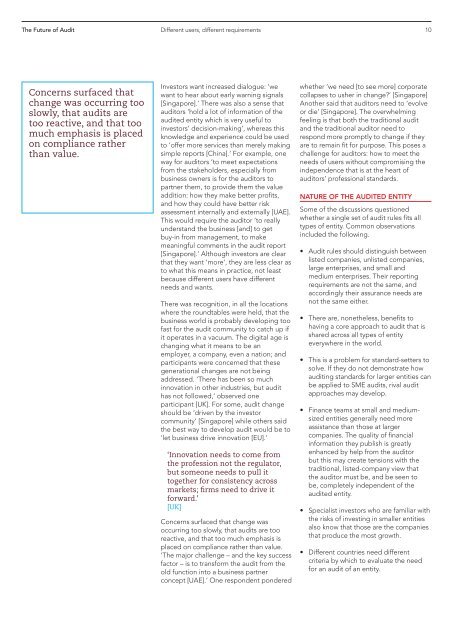The Future of Audit
10m6cY
10m6cY
You also want an ePaper? Increase the reach of your titles
YUMPU automatically turns print PDFs into web optimized ePapers that Google loves.
<strong>The</strong> <strong>Future</strong> <strong>of</strong> <strong>Audit</strong><br />
Different users, different requirements<br />
10<br />
Concerns surfaced that<br />
change was occurring too<br />
slowly, that audits are<br />
too reactive, and that too<br />
much emphasis is placed<br />
on compliance rather<br />
than value.<br />
Investors want increased dialogue: ‘we<br />
want to hear about early warning signals<br />
[Singapore].’ <strong>The</strong>re was also a sense that<br />
auditors ‘hold a lot <strong>of</strong> information <strong>of</strong> the<br />
audited entity which is very useful to<br />
investors’ decision-making’, whereas this<br />
knowledge and experience could be used<br />
to ‘<strong>of</strong>fer more services than merely making<br />
simple reports [China].’ For example, one<br />
way for auditors ‘to meet expectations<br />
from the stakeholders, especially from<br />
business owners is for the auditors to<br />
partner them, to provide them the value<br />
addition: how they make better pr<strong>of</strong>its,<br />
and how they could have better risk<br />
assessment internally and externally [UAE].<br />
This would require the auditor ‘to really<br />
understand the business [and] to get<br />
buy-in from management, to make<br />
meaningful comments in the audit report<br />
[Singapore].’ Although investors are clear<br />
that they want ‘more’, they are less clear as<br />
to what this means in practice, not least<br />
because different users have different<br />
needs and wants.<br />
<strong>The</strong>re was recognition, in all the locations<br />
where the roundtables were held, that the<br />
business world is probably developing too<br />
fast for the audit community to catch up if<br />
it operates in a vacuum. <strong>The</strong> digital age is<br />
changing what it means to be an<br />
employer, a company, even a nation; and<br />
participants were concerned that these<br />
generational changes are not being<br />
addressed. ‘<strong>The</strong>re has been so much<br />
innovation in other industries, but audit<br />
has not followed,’ observed one<br />
participant [UK]. For some, audit change<br />
should be ‘driven by the investor<br />
community’ [Singapore] while others said<br />
the best way to develop audit would be to<br />
‘let business drive innovation [EU].’<br />
‘Innovation needs to come from<br />
the pr<strong>of</strong>ession not the regulator,<br />
but someone needs to pull it<br />
together for consistency across<br />
markets; firms need to drive it<br />
forward.’<br />
[UK]<br />
Concerns surfaced that change was<br />
occurring too slowly, that audits are too<br />
reactive, and that too much emphasis is<br />
placed on compliance rather than value.<br />
‘<strong>The</strong> major challenge – and the key success<br />
factor – is to transform the audit from the<br />
old function into a business partner<br />
concept [UAE].’ One respondent pondered<br />
whether ‘we need [to see more] corporate<br />
collapses to usher in change?’ [Singapore]<br />
Another said that auditors need to ‘evolve<br />
or die’ [Singapore]. <strong>The</strong> overwhelming<br />
feeling is that both the traditional audit<br />
and the traditional auditor need to<br />
respond more promptly to change if they<br />
are to remain fit for purpose. This poses a<br />
challenge for auditors: how to meet the<br />
needs <strong>of</strong> users without compromising the<br />
independence that is at the heart <strong>of</strong><br />
auditors’ pr<strong>of</strong>essional standards.<br />
NATURE OF THE AUDITED ENTITY<br />
Some <strong>of</strong> the discussions questioned<br />
whether a single set <strong>of</strong> audit rules fits all<br />
types <strong>of</strong> entity. Common observations<br />
included the following.<br />
• <strong>Audit</strong> rules should distinguish between<br />
listed companies, unlisted companies,<br />
large enterprises, and small and<br />
medium enterprises. <strong>The</strong>ir reporting<br />
requirements are not the same, and<br />
accordingly their assurance needs are<br />
not the same either.<br />
• <strong>The</strong>re are, nonetheless, benefits to<br />
having a core approach to audit that is<br />
shared across all types <strong>of</strong> entity<br />
everywhere in the world.<br />
• This is a problem for standard-setters to<br />
solve. If they do not demonstrate how<br />
auditing standards for larger entities can<br />
be applied to SME audits, rival audit<br />
approaches may develop.<br />
• Finance teams at small and mediumsized<br />
entities generally need more<br />
assistance than those at larger<br />
companies. <strong>The</strong> quality <strong>of</strong> financial<br />
information they publish is greatly<br />
enhanced by help from the auditor<br />
but this may create tensions with the<br />
traditional, listed-company view that<br />
the auditor must be, and be seen to<br />
be, completely independent <strong>of</strong> the<br />
audited entity.<br />
• Specialist investors who are familiar with<br />
the risks <strong>of</strong> investing in smaller entities<br />
also know that those are the companies<br />
that produce the most growth.<br />
• Different countries need different<br />
criteria by which to evaluate the need<br />
for an audit <strong>of</strong> an entity.


